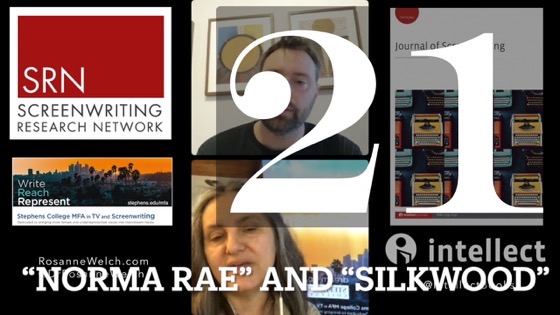Transcript:
Host: You mention the Silent Era being this
really open, Wild West period of film writing.
If we sort of sketch a line across the 20th Century and now into the 21st Century how
did women’s opportunities kind of wax and
wane in different periods?
What new opportunities opened up?
What things were foreclosed?
How did those kind of trends go across the
history of film?
Rosanne: Wonderful.
Well.
first of all, of course, in the Silent Era
it was – everybody going at it and having
fun until there was too much money in it and
then the women segued out.
Again, they went into novels and literature
although a few people survived that period,
but they weren’t writing westerns.
right?
Except – as you all know from the Autry
Museum – Betty Burabge was writing Gene
Autry movies, right?
So there were some women.
Leigh Brackett – again who is coming in
handy when we’re talking about “Star Wars”
was a western novelist and write western serialization
and things.
So we have some women but it becomes a dude
thing, right, and then this is a problem for
writers all the time.
You get pigeonholed just like actors do.
Oh you did that one movie and your brilliant
at it?
We want you to do fourteen on the same movie.
It’s very few people who get to be William Goldman and do a variety of different things. You have to really reach that peak. So women – it wanes in movies. Although B Serial have a little more opportunity for them and then, yes, TV is invented.
The Stephens College MFA in TV and Screenwriting is building a relationship with the Autry Museum of the American West since both organizations are devoted to bringing out more diverse and untold stories. Last year we were able to take our cohort of graduating MFA candidates to the museum’s theatre for a showing of Michael Wilson’s Salt of the Earth and we had plans to present a film of our choice this year – but of course the pandemic changed all that. Instead, Autry Curator Josh Garrett-Davis asked me if I would sit for an interview about female screenwriters in the western genre and so “When Women Wrote Westerns” came to be a part of their “What Is a Western? Interview Series”.
I had a great time discussing so many wonderful women writers – from Jeanne MacPherson to D.C. Fontana to Edna Ferber to Emily Andras. If you love westerns I suggest you watch Josh’s other interviews covering everything from the work of Native Americans in Western movies to films in the western-horror hybrid. — ![]()
What this entire presentation
As part of a series exploring the significance of the Western genre and the ways in which the movies shape our understanding of the American West, Autry Curator Josh Garrett-Davis interviews Professor Rosanne Welch about the women screenwriters of Hollywood and their contributions to the Western genre.
Find more information at the Autry Museum of the American West
Podcast: Play in new window | Download
Subscribe: RSS
![07 Women Writing Westerns from What Is a Western? Interview Series: When Women Wrote Westerns from the Autry Museum of the American West [Video]](https://rosannewelch.com/wp-content/uploads/2022/08/rmw-western-07.jpg)
![Powers Cameragraph projector, c. 1904-06, Hollywood Heritage Museum (Lasky-DeMille Barn) via Instagram [Photography]](https://rosannewelch.com/wp-content/uploads/2022/08/projector.jpg)




![16 Joan Didion & John Gregory Dunne from When Men Forget Women: The Many Ways Male Screenwriters Fail to Mention their Female Colleagues [Video]](https://rosannewelch.com/wp-content/uploads/2022/08/rmw-scms-2021-16.jpg)

![06 More On Women and Westerns from What Is a Western? Interview Series: When Women Wrote Westerns from the Autry Museum of the American West [Video]](https://rosannewelch.com/wp-content/uploads/2022/07/rmw-western-06.jpg)

![Vintage Film Makeup Kit, Hollywood Heritage Museum (Lasky-DeMille Barn) via Instagram [Photography]](https://rosannewelch.com/wp-content/uploads/2022/07/makeup-kit.jpg)
![15 Nice Guys and Allies from When Men Forget Women: The Many Ways Male Screenwriters Fail to Mention their Female Colleagues [Video]](https://rosannewelch.com/wp-content/uploads/2022/07/rmw-scms-2021-15.jpg)
